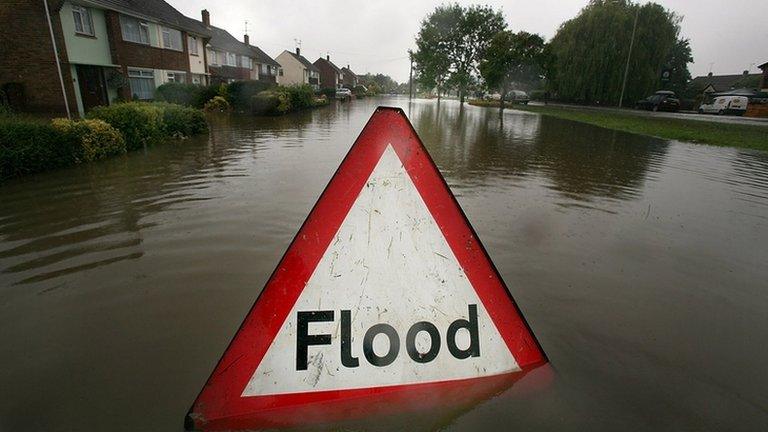Hundreds of homes flooded as downpours continue
- Published
The Met Office has described the weather as the most intense September storm in 30 years
More than 300 homes have been flooded and train services disrupted as heavy rain continues across parts of the UK.
Hundreds of people are facing a night in temporary accommodation as 87 Environment Agency flood warnings remain in place.
Some areas were expected to see 50mm (2in) of rain - an average fortnight's worth - in a day, the Met Office said.
BBC weather forecaster Peter Gibbs said it was the most intense September storm for 30 years.
The Met Office said an area of low pressure measuring 973 millibars had been recorded near the coast of north-east England - the lowest in the UK for September since 1981.
Transport was disrupted with part of the A1 closed in North Yorkshire and the East Coast mainline hit.
BBC Weather's Peter Gibbs has the details of why the low pressure system is being recorded as the most intense September storm in 30 years
More than 100 vehicles were trapped on a 30-mile stretch of the A1 between junction 49 (Dishforth) and junction 60 (Bradbury), which remains closed.
The A1 northbound at Tritlington in Northumberland was also shut because of water running on to the road, police have said.
Among the areas worst hit by flooding were Morpeth, Durham, Rothbury, Chester-le-Street and Stockton-on-Tees.
Some 19 elderly residents at a council care home in Gilling West, North Yorkshire, had to be carried to safety by firefighters after it became swamped by 3ft (1m) of water.
Travel disruption was caused in Scotland by heavy rain and winds of up to 70mph.
In England, the Environment Agency issued 83 flood warnings, external - indicating flooding is expected - in England and Wales.
There are 139 less serious flood alerts, indicating flooding is possible.
In Scotland, there are flood warnings in five regions, external, while in Northern Ireland there is no flood warning system but the Met Office has warned of persistent rain and gales.
The Environment Agency warned that river levels would continue to rise into Wednesday along the River Ouse in Yorkshire and the River Severn, which could cause further flooding.
In other developments:
Cleveland Police declared a major incident due to weather conditions, with around 29 properties in Stockton evacuated by the emergency services as water levels rose to around 4ft (1.2m)
In Morpeth, Northumberland, homes were evacuated and about 40 residents rescued by fire services after the River Wansbeck burst its banks
Heavy rains sent cars careering down the River Coquet and homes were flooded in Rothbury, Northumberland
Emergency services evacuated around 30 properties in Hartburn, Stockton, Teesside
About 50 properties in and around Wearside were evacuated
Heavy rain and severe winds caused power cuts and travel problems and swept sand-filled foam into parts of Scotland
Floods in Bristol caused one of the country's biggest blood and plasma banks to close, with thousands of units transferred to other centres by refrigerated lorries
Train services in northern England were affected by flooding. The East Coast mainline has reopened, external but with a limited service
Power was turned off to almost 40 homes in Merseyside as a precaution following flooding
Roads in north Wales remained closed after flooding and there was flood-related disruption to Arriva Trains Wales services
Trains between Great Malvern and Hereford remained cancelled after a "very deep hole" was found following heavy rain
A crew of refuse collectors had to be rescued by firefighters at Eryholme, North Yorkshire, when a river burst its banks and swamped their truck
A modern block of flats was evacuated in Newburn, Newcastle upon Tyne, after fears its foundations were being washed away
Schools in some areas were advised to close early, employers were urged to send staff home early and commuters were asked to stagger their journeys to alleviate problems on the struggling transport network.
David Jordan, director of operations at the Environment Agency, said: "We urge people to keep up to date with the weather forecast and remain prepared for flooding in their area, sign up to receive free flood warnings and stay away from dangerous flood water."
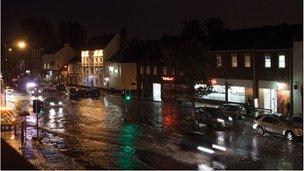
The high high street at Yarm, Stockton-on-Tees, was left flooded (Pic: Michael Buczek)
Flooding minister Richard Benyon offered his support to local MPs in helping affected areas recover.
He said: "Right now we need to let the Environment Agency and emergency services get on with their jobs and I'd like to thank them for the tireless work they are doing to keep people safe and reduce the risk of further flooding."
The Met Office has issued amber severe weather warnings, external, to "be prepared" for the East Midlands, north-east England, north-west England, Wales, the West Midlands, and Yorkshire and Humber
Less severe yellow warnings - indicating that people should "be aware" - are in place for many other parts of the UK.
Find your local BBC site
Among the worst hit places was Ravensworth, North Yorkshire, which had 89mm (3.5in) of rain in 24 hours and more than 100mm (4in) since Sunday.
Meanwhile, an inquest was opened at West London Coroner's Court into the death of a woman struck by a falling tree branch in Kew Gardens on Sunday.
New Zealand-born account manager Erena Wilson, 31, from London, died instantly when she was hit by the branch while walking in the gardens with friends.
The heavy rain in the UK this week is due to an area of low pressure which has moved north across the country from the Bay of Biscay and is now off the north-east coast, forecasters say.
- Published25 September 2012
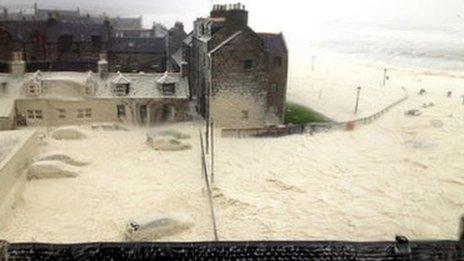
- Published25 September 2012
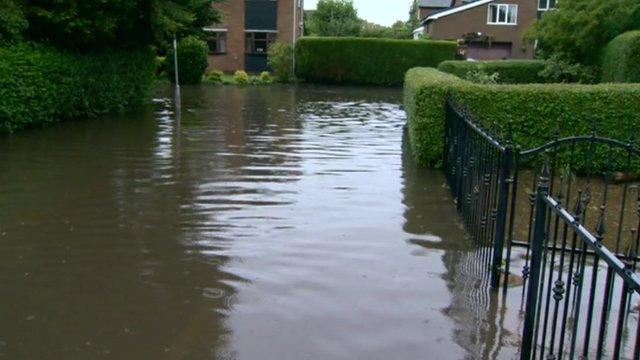
- Published25 September 2012
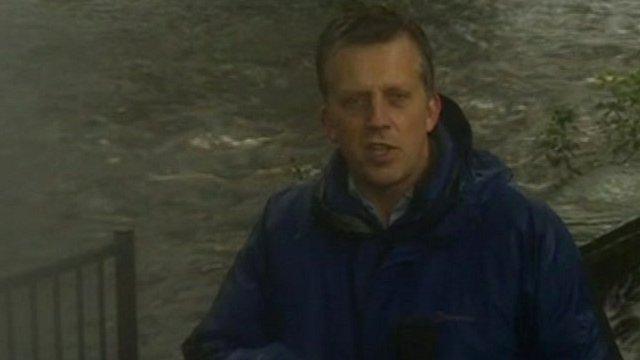
- Published24 September 2012
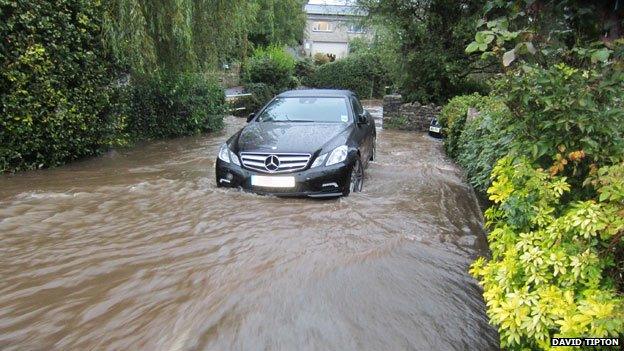
- Published24 September 2012
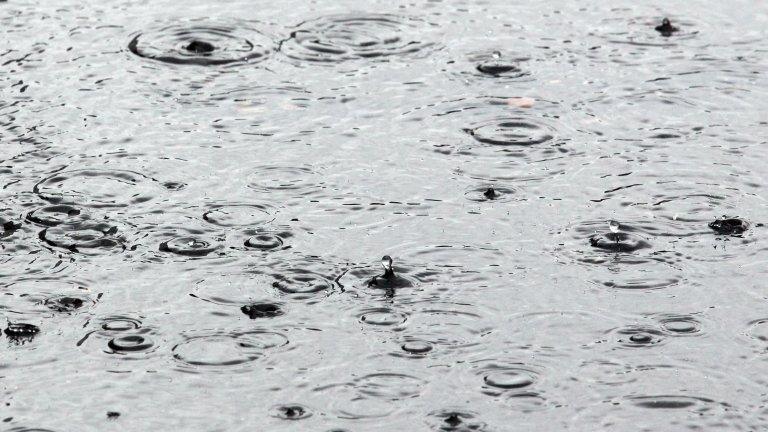
- Published24 September 2012
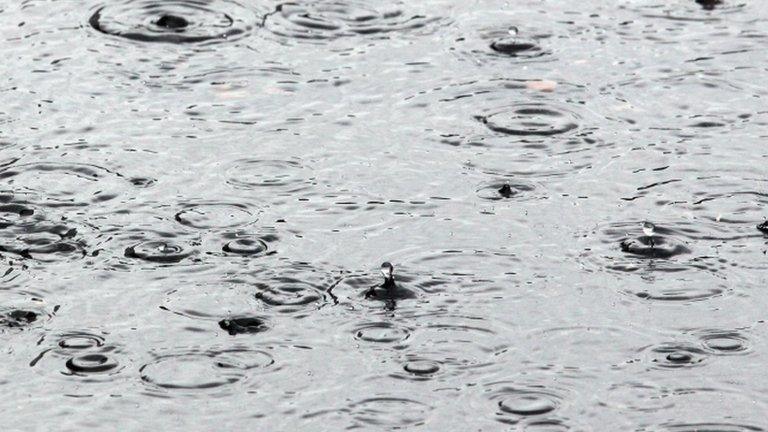
- Published24 September 2012
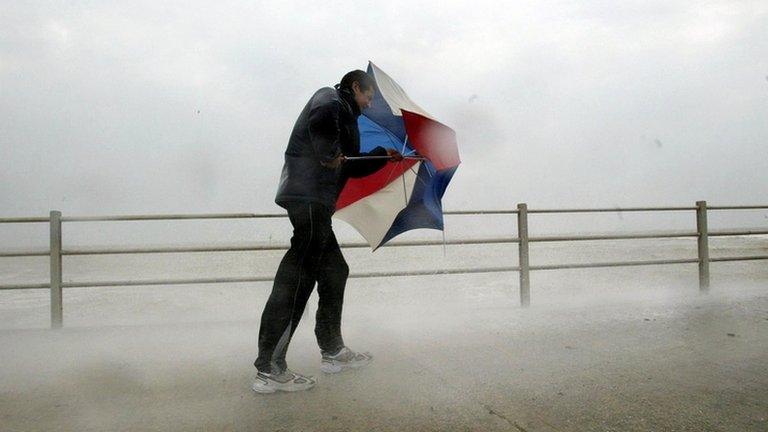
- Published24 September 2012

- Published26 November 2012
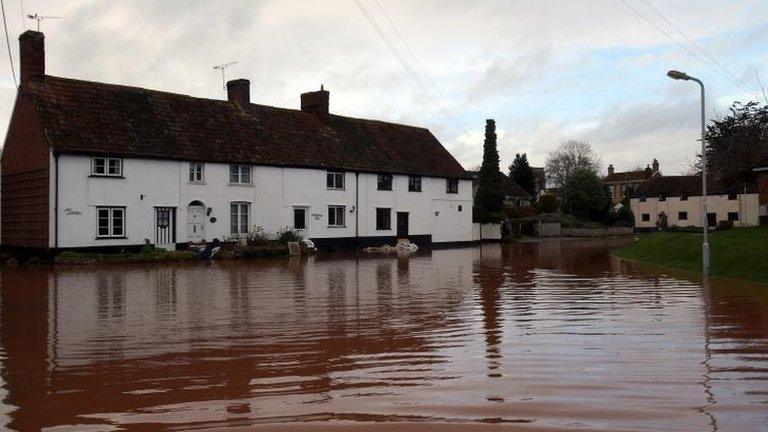
- Published6 July 2012
